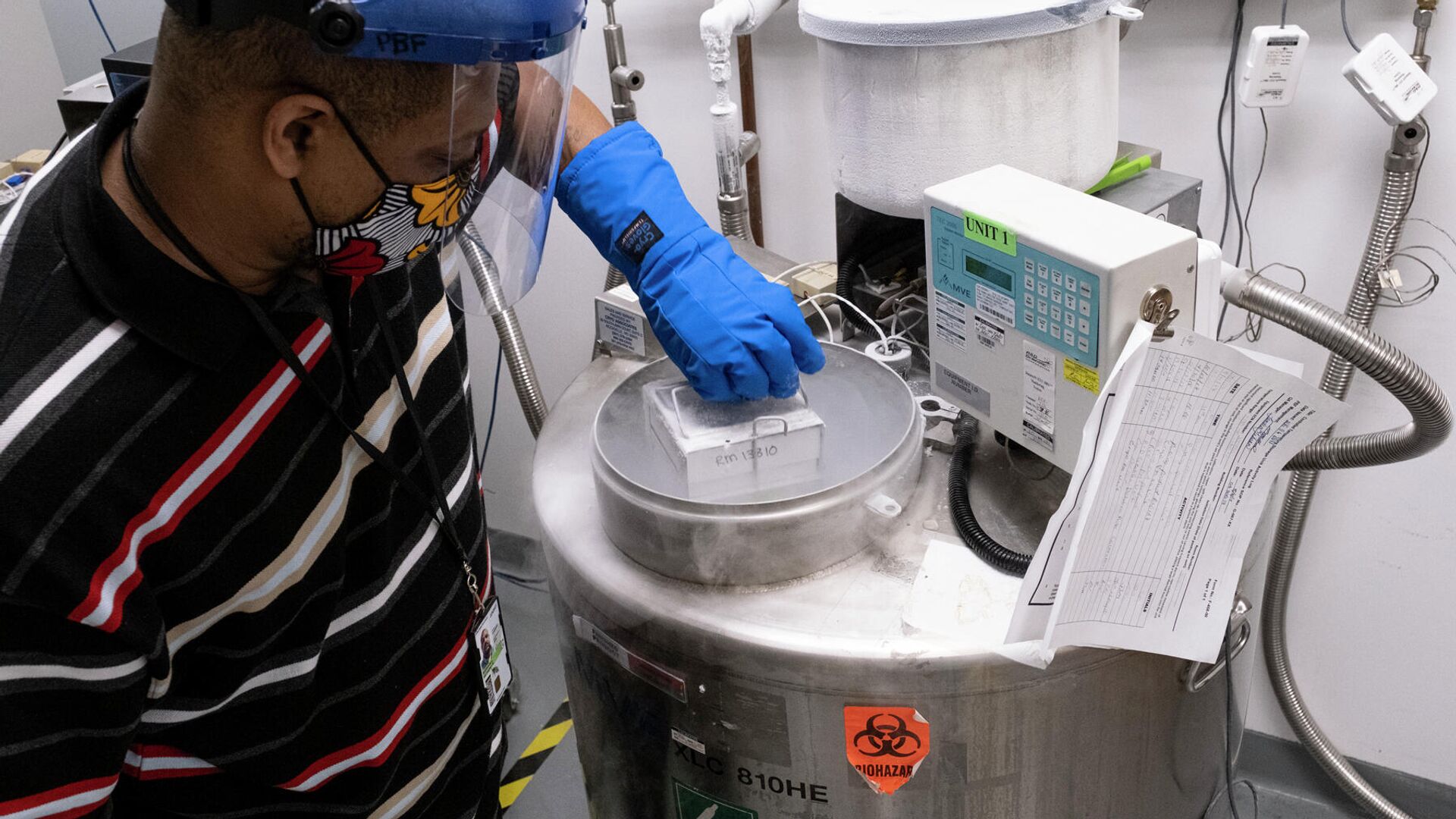https://sputnikglobe.com/20211222/us-army-wraps-preclinical-trials-on-covid-19-vaccine-designed-to-combat-variety-of-variants--1091733029.html
US Army Wraps Preclinical Trials on COVID-19 Vaccine Designed to Combat Variety of Variants
US Army Wraps Preclinical Trials on COVID-19 Vaccine Designed to Combat Variety of Variants
Sputnik International
Initial reports claimed that scientists at the Walter Reed Army Institute of Research (WRAIR) were developing a vaccine against all variants of SARS-CoV-2, a... 22.12.2021, Sputnik International
2021-12-22T21:28+0000
2021-12-22T21:28+0000
2023-04-13T12:44+0000
us department of defense (dod)
us army
covid-19
public health
pentagon
https://cdn1.img.sputnikglobe.com/img/07e5/0c/16/1091732448_0:123:1800:1136_1920x0_80_0_0_84d66f3f1109f796685045d9e1c24aaa.jpg
The WRAIR issued a news release on Wednesday offering clarification against some "inaccurate representations" about the research facility's development of the Spike Ferritin Nanoparticle (SpFN), the US Army-developed COVID-19 vaccine. While the SpFN has yet to be tested on the omicron variant, "testing against the variants is ongoing in a neutralization assay in the laboratory," the facility noted. The WRAIR went on to claim that facility scientists "remain encouraged" by early data from preclinical trials, which were published on December 16 in Science Translational Medicine, an interdisciplinary medical journal. Researchers are now analyzing data from Phase One of human trials, but no timeline was provided. The WRAIR's protein subunit nanoparticle vaccine works by presenting a fragment of the SARS-CoV-2 virus to one's immune system to elicit a broad, protective response. The SpFN includes ALFQ, a vaccine adjuvant that is part of the Army Liposome Formulation (ALF) family.According to the facility, the vaccine could potentially be useful on a global scale, as it remains stable at a wide range of temperatures, unlike the Pfizer-BioNTech and Moderna-developed vaccines, which require refrigeration. Dr. Kayvon Modjarrad, director of Walter Reed’s infectious diseases arm, told Defense One that the development and progress made so far on the WRAIR vaccine is "very exciting." However, there is clearly more work to be done, as COVID and its many variants have become a moving target for researchers. "We need to evaluate it in the real-world setting and try to understand how does the vaccine perform in much larger numbers of individuals who have already been vaccinated with something else initially […] or already been sick," he told the outlet in an exclusive interview.
Sputnik International
feedback@sputniknews.com
+74956456601
MIA „Rossiya Segodnya“
2021
News
en_EN
Sputnik International
feedback@sputniknews.com
+74956456601
MIA „Rossiya Segodnya“
Sputnik International
feedback@sputniknews.com
+74956456601
MIA „Rossiya Segodnya“
us army, walter reed, covid-19, vaccine, public health
us army, walter reed, covid-19, vaccine, public health
US Army Wraps Preclinical Trials on COVID-19 Vaccine Designed to Combat Variety of Variants
21:28 GMT 22.12.2021 (Updated: 12:44 GMT 13.04.2023) Initial reports claimed that scientists at the Walter Reed Army Institute of Research (WRAIR) were developing a vaccine against all variants of SARS-CoV-2, a virus that causes respiratory illness in humans. However, this appears to be only partially true, according to clarification provided by the Maryland-based biomedical research facility.
The WRAIR issued a news release on Wednesday offering clarification against some "inaccurate representations" about the research facility's development of the Spike Ferritin Nanoparticle (SpFN), the US Army-developed COVID-19 vaccine.
"The Spike Ferritin Nanoparticle platform is designed to protect against an array of SARS-CoV-2 variants and SARS-origin variants but was not tested on the Omicron variant," the release stated.
While the SpFN has yet to be tested on the omicron variant, "testing against the variants is ongoing in a neutralization assay in the laboratory," the facility noted.
The WRAIR went on to claim that facility scientists "remain encouraged" by early data from preclinical trials, which were
published on December 16 in Science Translational Medicine, an interdisciplinary medical journal.
Researchers are now analyzing data from Phase One of human trials, but no timeline was provided.
The WRAIR's protein subunit nanoparticle vaccine works by presenting a fragment of the SARS-CoV-2 virus to one's immune system to elicit a broad, protective response. The SpFN includes ALFQ, a vaccine adjuvant that is part of the
Army Liposome Formulation (ALF) family.
"Preclinical and early clinical studies have demonstrated ALFQ to be safe and strongly potent as a vaccine adjuvant," the WRAIR claimed.
According to the facility, the vaccine could potentially be useful on a global scale, as it remains stable at a wide range of temperatures, unlike the Pfizer-BioNTech and Moderna-developed vaccines, which require refrigeration.
Dr. Kayvon Modjarrad, director of Walter Reed’s infectious diseases arm, told Defense One that the development and progress made so far on the WRAIR vaccine is "very exciting."
However, there is clearly more work to be done, as COVID and its many variants have become a moving target for researchers.
"We need to evaluate it in the real-world setting and try to understand how does the vaccine perform in much larger numbers of individuals who have already been vaccinated with something else initially […] or already been sick," he told the outlet in an exclusive interview.

